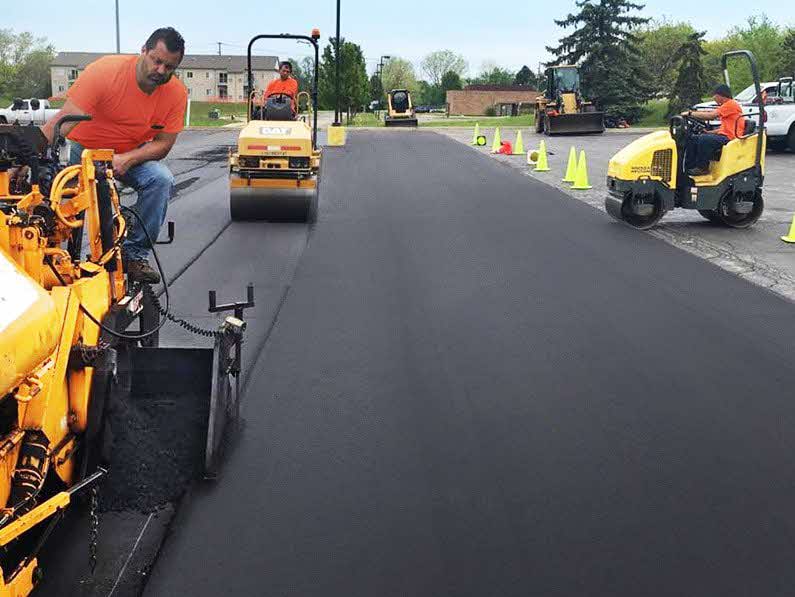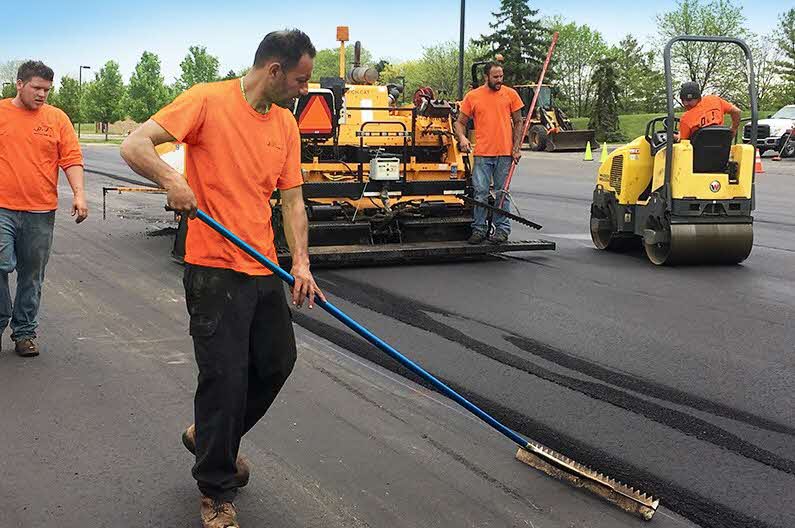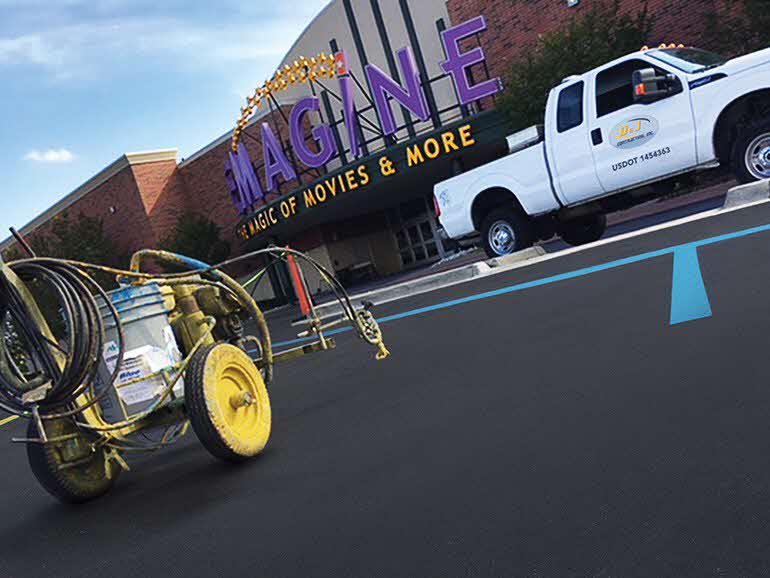Striping Waldenburg Michigan
We Are Locally Owned
& Operated For 36 Years
About Striping
Introduction
For those looking to improve the aesthetic appeal and safety of a commercial property, striping is an often overlooked yet crucial service. Defined as the process of painting lines and markings on asphalt or concrete, striping can contribute significantly to the orderly and efficient use of parking spaces, driving path, and pedestrian walkways. In this definitive guide to striping, we’ll delve into an all-encompassing insight about this vital service, the process, and its multiple benefits. We will further discuss various associated key aspects like parking lot striping contractors, asphalt striping, sealing and striping, and many more. So, let’s get started.
The Process of Striping
The process of striping begins with an assessment of the existing condition of the parking lot or other paved surfaces. The type of material (asphalt or concrete), drilling, striping, and sealing requirements are taken into account. Asphalt striping specialists then prepare the surface by cleaning it and ensuring it’s free from oils and other contaminants. Once the surface is prepared, the line striping starts. It involves using high-quality paint to create lines and marks that provide guidance to drivers and pedestrians. The process varies depending on whether it’s new paintwork or a re-striping job, but the ruler—the essence of precision—remains consistent.
The Role of Parking Lot Striping Contractors
Quality sealing and striping are not DIY jobs. You need the expertise of parking lot striping contractors who have a deep understanding of local regulations, the right equipment, and experience. The contractors’ role is to chalk out a plan that ensures maximum space utilization, easy navigation, and the safety of drivers and pedestrians. Once the plan is set, the contractor executes it with perfection. They also provide services like asphalt sealing and striping near you, ultimately enhancing the lifespan of your parking lot.
Advantages of Striping
Striping in commercial properties offers a host of advantages. Firstly, it enhances the visual appeal, making the spaces look well-cared-for and professional. The second crucial advantage is increased safety. Properly striped parking lots enable orderly parking, reducing the chances of accidents. It also contributes to better accessibility, providing clear markings for disabled parking, loading zones, etc. Well-known asphalt striping companies also offer parking lot seal and stripe services, adding a layer of protection to the material against harsh weather conditions, oil spills, and daily wear and tear.
Affordable Striping and Sealing
Worried about the costs? When considering all the benefits, striping is an affordable service. There are several affordable striping and sealing services available. To find reasonable quotes, a simple online search like ‘asphalt striping near me’ can provide multiple options in your vicinity. Request an estimate, compare prices, and select the one best fitting your requirements and budget.
Selecting an Asphalt Striping Company
The decision of hiring an asphalt striping company should be carefully thought out. Consider their experience, reviews, pricing, and the quality of the materials they use. A reputable company will not only excel in striping but also offer a range of other services like paving striping, asphalt striping, and parking lot paving and striping. Using the ‘asphalt striping companies near me’ keyword, you should be able to narrow down your choices easily.
Conclusion
Designed to improve the efficiency and safety of commercial parking lots and other pavement, striping is worth considering. It is a visual guide for drivers and pedestrians and an element that enhances the appeal of the premises. As we’ve seen, there are more than a few compelling reasons to consider striping, from safety to aesthetics to space efficiency, which all contribute to the overall value of a commercial property. But remember, the job should be entrusted to professional parking lot line striper who is well-versed in handling such tasks with perfection. Don’t delay; seek out those offering quality parking lot repair and striping services near you.
Visit your local asphalt striping contractor, talk with the experts, discuss your requirements, and get your commercial property striped for better efficiency and aesthetic appeal.
Contact Us Today for a FREE
Striping Quote






About Waldenburg, Michigan
History
The founders of Macomb Township arrived in the early 19th century in search of flat and fertile farmland, like that near the Clinton River. Many of these early settlers were of German descent, and the German influences remain today. The Township of Macomb was officially approved by the Legislative Council on March 7, 1834.
The township was named in honor of General Alexander Macomb, who was a highly decorated veteran of the War of 1812; his successful mercantile family owned most of Macomb County at one time.
Macomb Township was a large part of the lumber and logging industry of southeast Michigan in the late 19th century and early 20th century. Logs would be transported south from Wolcott Mill in Ray Township, down the Middle Branch of the Clinton River to sawmills. Romeo Plank Road is a historic route that follows the river on its western side.
Macomb Township experienced significant growth during the period of 2000–2008, boasting a 48% increase in population.
Geography
Macomb Township is at the geographic center of Macomb County. Mount Clemens, the county seat, is 7 miles (11 km) to the south, and downtown Detroit is 26 miles (42 km) to the south-southwest.
According to the U.S. Census Bureau, the township has a total area of 36.35 square miles (94.15 km), of which 36.25 square miles (93.89 km2) are land and 0.09 square miles (0.23 km), or 0.26%, are water.
Communities
- Macomb (or Macomb Corners) is located in the northwest part of the township at 42°42′03″N 82°57′33″W / 42.70083°N 82.95917°W on Romeo Plank Road at 25 Mile Road, near the Middle Branch of the Clinton River.
- Meade is located in the northeast portion of the township at 42°43′03″N 82°52′26″W / 42.71750°N 82.87389°W on the boundary with Ray Township at 26 Mile Road and North Avenue.
- Waldenburg is located in the central portion of the township at 42°39′26″N 82°56′15″W / 42.65722°N 82.93750°W, a few miles south of Macomb on Romeo Plank Road and the Clinton River, chiefly in the 22 Mile Road area.
Demographics
| Race / Ethnicity (NH = Non-Hispanic) | Pop 2000 | Pop 2010 | Pop 2020 | % 2000 | % 2010 | % 2020 |
|---|---|---|---|---|---|---|
| White alone (NH) | 47,968 | 70,906 | 77,042 | 95.03% | 89.10% | 84.05% |
| Black or African American alone (NH) | 420 | 3,096 | 4,627 | 0.83% | 3.89% | 5.05% |
| Native American or Alaska Native alone (NH) | 88 | 136 | 99 | 0.17% | 0.17% | 0.11% |
| Asian alone (NH) | 710 | 2,446 | 3,198 | 1.41% | 3.07% | 3.49% |
| Pacific Islander alone (NH) | 4 | 15 | 19 | 0.01% | 0.02% | 0.02% |
| Other race alone (NH) | 27 | 72 | 216 | 0.05% | 0.09% | 0.24% |
| Mixed race or Multiracial (NH) | 526 | 1,106 | 3,603 | 1.04% | 1.39% | 3.93% |
| Hispanic or Latino (any race) | 735 | 1,803 | 2,859 | 1.46% | 2.27% | 3.12% |
| Total | 50,478 | 79,580 | 91,663 | 100.00% | 100.00% | 100.00% |
As of the census of 2010, there were 79,580 people and 27,585 households in the township. The population density was 2,196.8 inhabitants per square mile (848.2/km2). There were 27,585 housing units. The racial makeup of the township was 90.5% White, 3.9% African American, 0.2% Native American, 3.1% Asian, 0.0% Pacific Islander, 0.7% from other races, and 1.6% from two or more races. Hispanic or Latino of any race were 2.3% of the population.
As of the census of 2000, there were 50,478 people, 16,946 households, and 14,065 families residing in the township. The population density was 1,391.7 inhabitants per square mile (537.3/km2). There were 17,922 housing units at an average density of 494.1 per square mile (190.8/km). The racial makeup of the township was 96.12% White, 0.84% African American, 0.19% Native American, 1.41% Asian, 0.01% Pacific Islander, 0.31% from other races, and 1.12% from two or more races. Hispanic or Latino of any race were 1.46% of the population.
There were 16,946 households, out of which 45.3% had children under the age of 18 living with them, 73.7% were married couples living together, 6.5% had a female householder with no husband present, and 17.0% were non-families. 13.7% of all households were made up of individuals, and 3.9% had someone living alone who was 65 years of age or older. The average household size was 2.97 and the average family size was 3.30.
In the township the population was spread out, with 30.2% under the age of 18, 6.9% from 18 to 24, 35.1% from 25 to 44, 20.3% from 45 to 64, and 7.4% who were 65 years of age or older. The median age was 34 years. For every 100 females, there were 99.6 males. For every 100 females age 18 and over, there were 97.3 males.
Education
The public school districts that serve residents of Macomb Township are Chippewa Valley Schools, L’Anse Creuse Public Schools, New Haven Community Schools and Utica Community Schools. For public library services, the Township is served by the Clinton-Macomb Public Library district.
Contact Us Today for a FREE
Striping Quote
Our Striping services are available in Waldenburg as well as all of Macomb County.
Our dedicated team at D&J Contracting Inc is at-the-ready to provide you with great customer service and first class Striping services. Reach out to us at (586) 954-0008 to discuss your Striping needs today!